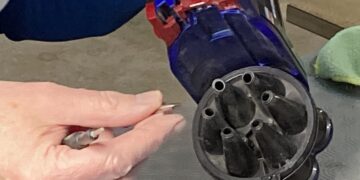With the warmest February temperatures on record brightening our days, we are all feeling an increased sense of anticipation of spring just around the corner … unless a cousin of last year’s ‘Beast from the East’ pays us a visit in March.
While the increased temperatures and sunlight are a welcome change from a chilly winter, they also bring some potential problems for our furry friends.
Like so many people animals suffer from allergies with symptoms including generalised itching or pruritus, itchy feet, sore ears, conjunctivitis, sneezing and respiratory signs.
Diagnosing and treating allergies in animals can be extremely challenging and in many cases we can only control or manage the disease without ever achieving a true cure.
This can be frustrating for both owner and veterinary surgeon as they try to achieve the best outcome for the animal.
The first and very important step in approaching a suspected allergy is to rule out parasitic (fleas, mites etc) or infectious cause for the symptoms. Depending on the individual case this can include skin scrapes, hair plucks, bacterial cultures and longer courses of appropriate antibiotics.
This is important as many of the treatments for allergies are immunosuppressive and can allow parasites or infections to thrive if they are left untreated.
We also strongly recommend using an effective flea control treatment as an ongoing measure.
Once these causes are ruled out, we feel it is imperative to exclude a dietary allergy before proceeding to long term medications.
In order to rule out a dietary allergy we usually use one of the advanced hypoallergenic commercial foods for a four- to six-week period.
If this diet is fed exclusively and the allergy symptoms persist, we are confident that it is not a diet allergy and then go on to look at the various treatment options available.
If the symptoms subside during the diet trial, then we know that dietary control will be critical to managing the particular case and look at long-term dietary solutions.
There are many ways we can treat year-round and seasonal allergies, and it often requires trial and error to find the most appropriate protocol for an individual animal. In most cases we use a core medication, often an immunosuppressive drug, in conjunction with supplemental medications and therapies including anti-histamines, shampoos, conditioners and EFAs (essential fatty acids).
At St Vincents Vets we also offer immunotherapy, the so-called desensitising injections, where we test for the specific allergens and then inject the animal with increasing amounts of the these allergens with the goal of reducing the animals response to them.
This approach is expensive, but when it works can be extremely rewarding as we avoid using the ongoing medications mentioned above.
Immunotherapy is the only treatment currently available that changes the immune system’s response to allergies rather than suppressing the immune system or dulling the clinical signs.
However not all animals will respond, and we would then need to fall back on the other therapeutic options.
If you are concerned about your pet being showing any of the symptoms mentioned earlier in this article please contact your vets to arrange an appointment to begin initial investigations.
In my experience early intervention, diagnosis and management can significantly improve the long term successful management of this challenging disease. It is also important that both vet and owner acknowledge that while some allergies are easily controlled, allergies can be debilitating and negatively affect the animal’s quality of life, and our goal is to work with you, the owners, to reduce or eliminate these symptoms to give our pets the best outcome we can achieve.
Michael Morrow owns and runs St Vincents Veterinary Surgery, an independent veterinary practice providing personal care for pets in and around Wokingham. To find out more find us on Facebook or visit www.stvincentsvets.co.uk












































